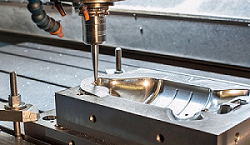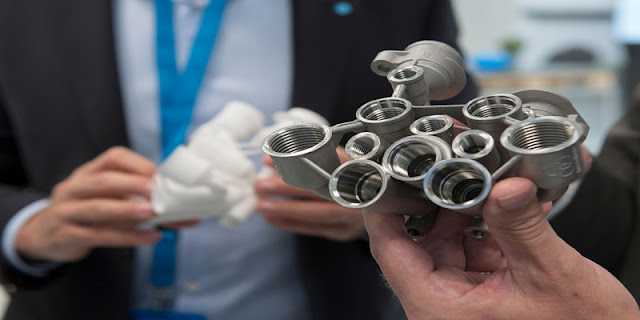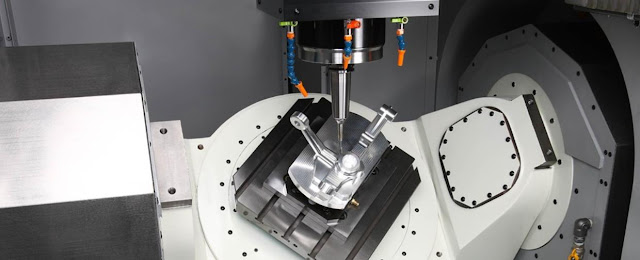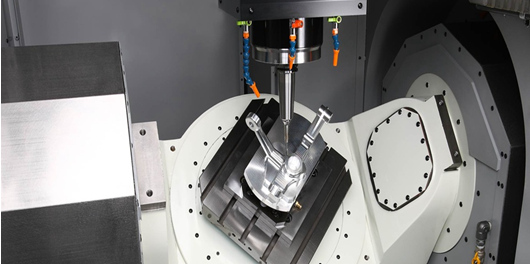How CNC Machine Shop Apply in Prototype Manufacturing
What is CNC machining technology?
Nowadays many prototype companies possessa CNC machine shop, especially CNC milling. Then what is CNC machining
technology?
Computer Numerical control (CNC) is the
use of computers to automatically control processing tools and 3D printers. CNC
machine tools process a piece of material (metal, wood, plastic, ceramic or
composite) in accordance with coded program instructions, without the need for
manual operation. Therefore, compared with traditional machine tools, CNC
machine tools have better machining precision in CNC machine metal and plastic. In modern CNC systems, the design
of mechanical parts and their manufacturing processes are highly automated. The
mechanical dimensions of the part are defined using CAD software and then
converted to manufacturing instructions using computer aided manufacturing
(CAM) software.
There are several commonly used CNC
machines: CNC Milling machine, CNC turning, CNC plasma cutter, among which CNC
milling machine can be divided into 3-axis, 4-axis, 5-axis milling machines.
Different axis can process different direction of CNC parts. They make a huge
sense on nowadays’ prototype manufacturing.
What is
Precision Machining?
Precision machining is an evolving
manufacturing sector that affects our daily lives. Therefore, it is a key
contributor to this field today. But what is precision machining?
Precision machining is a process that
removes excess raw material from the work-piece while maintaining tight
tolerances to produce the finished product. In a word, this means processing
large pieces of material into more precise parts so that they meet very precise
specifications.
What is Quality
Precision Machining?
Quality precision machining requires
very specific drawings that can be produced in accordance with CAD or CAM
programs such as AutoCAD and TurboCAD. The software can help produce complex,
3D charts or overviews needed to make tools, machines or objects. These
blueprints must be followed in great detail to ensure that the product maintains
its integrity. Although most precision machining companies use some form of
CAD/CAM program, they still use hand-drawn sketches often during the initial
stages of design.
The second factor to be precision
machining is using CNC equipment. Precision mechanics use a variety of
materials such as glass, bronze, plastic, graphite, steel and other metals. A
variety of precision machining tools and techniques will be used according to
the size of the project and the materials involved. Therefore, operators must be
proficient in these different processes and equipment and have experience. They
can use any combination of grinders, drill presses, lathes, saws, CNC milling
machines, and even high-speed robots to get CNC parts done. With the high
precision involved, CNC machine tools are often used to make sure that the
finished product meets the exact dimensions.
The aerospace industry may use high
speed machining, while the woodworking tool manufacturing industry may use
photochemical etching and milling processes. The output of a run, or the
specific number of any particular item, can be thousands or just a few.
Precision machining usually requires the programming of numerical control
equipment, which means that they are computer numerically controlled. CNC
equipment allows precise dimensions to be followed throughout the operation of
the product.
How CNC Machine Shop Apply in Prototype Manufacturing
Today's industry is growing at an
alarming rate. In order to meet the needs of today's customers, keeping up with
the trend or going ahead of the trend is critical to your business. Here are 7
advantages of using CNC precision machining in the prototype manufacturing.
1.
Lower Errors.
By using a CNC machining, once the
correct specifications are entered, the automated precision machining process
takes over. Compared to manual machining, the chance of error is extremely low.
When you outsource this work, you don't have to hire the highly skilled
employees who can help run these machines.
2.
Reducing material waste
Because the core concept of finishing is
subtraction, there is a huge potential for material waste from start to finish
on a product. CNC precision machining helps reduce material loss due to human
error. The contract company may also purchase the bulk of the materials you
need to work and transfer the money you have saved.
3.
Consistent product quality
Through the precision machining of CNC
machine tools, consistent output can be obtained again and again. Consistently
producing high quality CNC machining metal and plastic parts can enhance
customer confidence and increase brand awareness.
4.
Improving Workflows
When considering how to manage
opportunity costs, the key is that engineers' time and skills are spent on
actual product development rather than minor design changes. Companies that
offer contract precision machining services can often assist with minor
modifications during the prototyping process to meet design or industry
standards.
5.
Shorten turnaround time
There is an opportunity to improve your
existing plant workflow (you can use internal precision machines if you can
afford machine investment and skilled workforce), or use contract processing
services. Contract companies have experience with this type of work and have
the right systems to get the job done as efficiently as possible.
1.
Faster production cycles
Modern CNC machining brings your
products to market faster, giving you an advantage over facilities that still
use the old methods. You may be more flexible due to changes in industry rules
or customer requirements.
7. Simplified Prototype Testing
1) Precision machining offers your
business an opportunity to explore smaller niche markets with potentially high
returns. Precision CNC machining can allow for a flexible product development
phase because the niche opportunities are deterministic. If there is demand in
the market, processing can be transferred to full-size production mode.
2) Precision machining also allows
prototypes to have features rather than more concepts/design prototypes.
Functional prototypes are more likely to inspire investor confidence than
conceptual prototypes.







Comments
Post a Comment